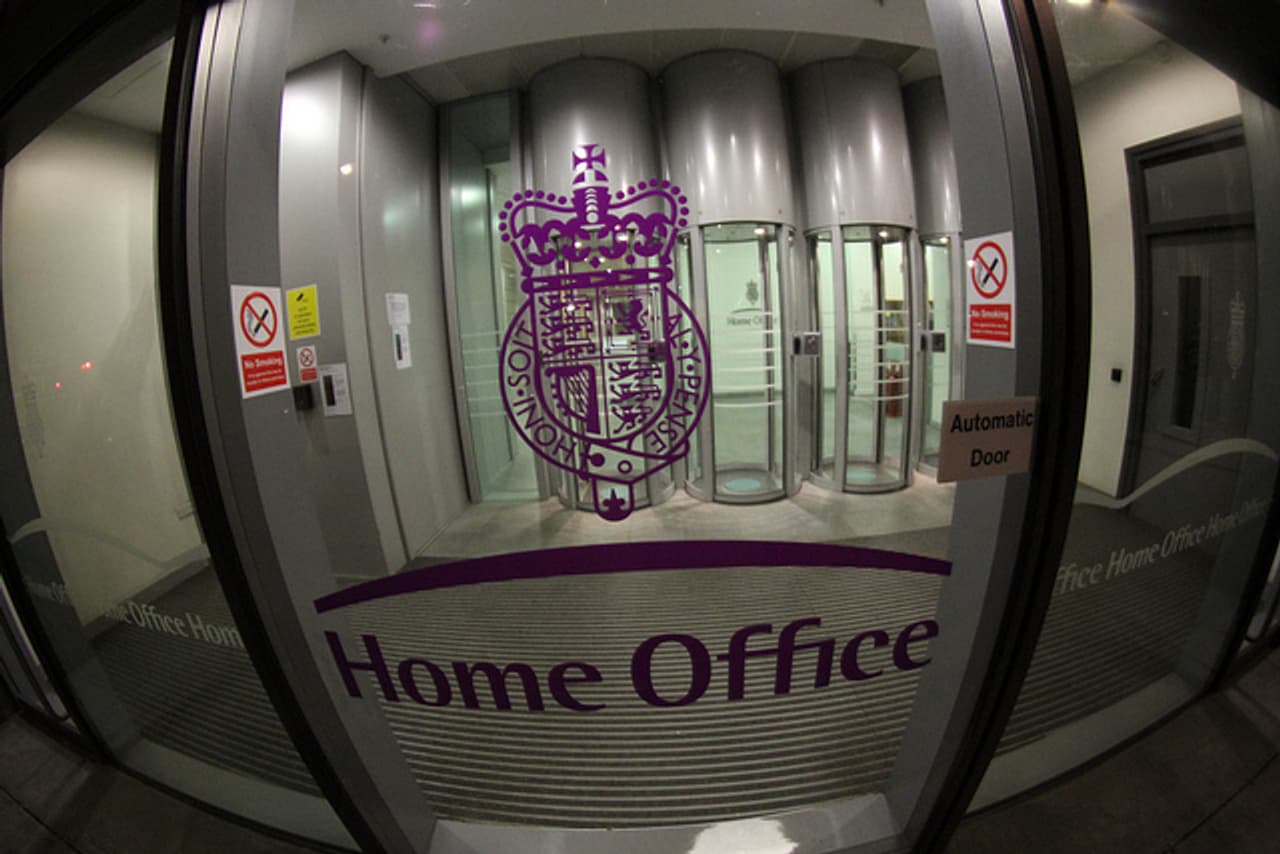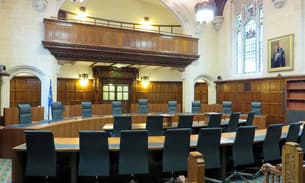
How do you prove you’re not a national security risk? One man’s experience of secret justice
Home Office by George Olcott/Flickr
A former UK border official has failed in his seven year battle to discover why he was sacked by the Home Office on national security grounds – in a case highlighting the Kafkaesque world of secret justice.
Not a single word of explanation has ever been given to the 54 year old about why he was removed from his job and had his life ruined days after returning from a holiday to see his relatives in the tribal areas of Pakistan seven years ago.
Mr Kiani (he has asked us not to publish his full name) was told he was a national security risk but he has never been arrested, let alone convicted of any crime. He has not even been told a “minimum gist” of the allegations against him. The Home Office claims the proof against him is so sensitive it must remain secret.
He has fought the decision for seven years, with his lawyers arguing against the Government’s controversial use of secret evidence and closed court hearings.
The effect on his life has been devastating and he is now also fighting mental ill health.
“If I have done something wrong, please tell me,” he told the Bureau. “I just want to know before I die.”
The Court of Appeal on Tuesday upheld the decision to deny him any details of the government’s case against him.
His lawyer, Shazia Khan of Bindmans, said the court’s decision would send a signal to public authorities that they could rely on secret hearings “wholly without scrutiny and challenge”. She said this would mean more of them, “irreparably damaging fairness and access to transparent justice in the UK”.
The Bureau has been following his case as part of its long running investigation into secret justice.

Ancestral homeland
It was following a trip to his ancestral homeland in the war torn tribal areas of Pakistan that his nightmare began. He had his security pass removed, he was suspended from duty and two years later, he was finally sacked.
He was born in Khyber Pakhtunkhwa, northwest Pakistan, where the Taliban is now active. He came to the UK in the Eighties after marrying a British woman and he became a dual national.
He worked as a community adviser for a local authority in London, and in 2001 he was employed by the Home Office.
He trained at Gatwick Airport and was later posted to Heathrow and Stansted before his final placement at Harmondsworth detention centre, where he helped to deport failed asylum seekers and illegal immigrants.
“My job was to contact the detainee’s embassy, get the necessary documentation and remove them from the United Kingdom as quickly as possible,” he said in an interview with the Bureau.
In 2004/5, he served a six-month stint in Dhaka, Bangladesh, where he worked as an entry clearance officer.
He enjoyed his job and said he was loyal, and that his appraisals were regularly good.
However, he admits his career was not entirely unblemished.
In 2005 he was disciplined for accessing a computer to check if his sister, whom he had sponsored to come to the UK, had returned to Pakistan.
That earned him a warning which remained on file for a year and he was denied a further overseas posting as a result.
Then, three years later in 2008, came the trip to Pakistan. At the time he was working as “removal team leader” and he says he secured the permission of his boss for a three-week holiday to the country.
“I had the consent of my manager, I always told my manager if I was going to Pakistan,” he said.
He said he visited his parents, who were living in Rawalpindi at the time, and went to the “village where my forefathers came from” in Khyber Pakhtunkhwa.
He said he also visited friends in Lahore.
He was due back in the office on March 18. He said: “I had an early morning shift and I was there 15 minutes before. As soon as I entered the building I found the senior manager waiting. She said, ‘Come with me.’ She told me that I’d been suspended from duty but that she could not give me any information. She took my passes and told me not to contact the office any more. Later I was told there were ‘national security concerns’.”
He added: “These are very big words, you know.”
And he has no idea what they might mean in his case, even after seven years of legal action – because even the most basic details of the evidence against him are heard in closed court hearings.
The evidence is heard only by the judges and by special advocates appointed to act for him. But these advocates are not allowed to relay any details to their client, or even communicate with him.
Kiani told the Bureau: “I said repeatedly – I’ve told the courts – if I’ve done anything, let me know. Charge me. Let me defend myself. I’m an immigration officer – everything had to be declared prior to joining the job.”
In April 2008 he was called to a meeting to discuss his suspension.
He said: “The woman interviewing me had a file in front of her. I said to her: ‘Tell me what you want to know,’ and she said: ‘You tell me about it’.”
He said she would not answer questions about what “it” was.
He said: “I told her everything, about the holiday, my life, my business, my finances – you can check everything.”
Years later, the thought of that meeting still riles him. The interviewer, who he thinks was “from the security department”, did not seem to know anything about his background.
He said: “She didn’t know where I was from. And she told me that I was allowed to keep my Pakistani ID card as a favour. Well, I’m a dual national – it’s my right to keep my ID card. They should have the facts right.”
He appealed his suspension, but failed. His security clearance was withdrawn in June 2008. No reasons were provided. He was formally sacked in 2010, against which he also appealed unsuccessfully. At no point was any further explanation given.
At his suspension he said he was told not to contact his colleagues. He said he obeyed, and has not seen or heard from them since.
“It’s as though I’ve been dug into the grave,” he said. “I want my integrity back.”
His appeal to the Security Vettings Appeal Panel, to which civil servants may appeal against the withdrawal of their security clearance, resulted in disclosure of a possible reason.
In 2007, Kiani’s wife had become a director of a company specialising in advice on immigration matters including work permits, British citizenship and immigration appeals.
The Panel revealed concerns had been raised over whether Mr Kiani might abuse his position to assist his wife in the business.
“There is no reason to keep this secret,” Kiani told the Bureau, who points out that his wife was with the company for less than a year and had left by the time he was suspended. “If that is really the problem, this is a disciplinary issue, not a national security risk.”
He launched an employment tribunal case against the Home Office on grounds of race and religious discrimination and unfair dismissal but insists he does not want money.
His case failed at first instance. He appealed, arguing that it was impossible to argue against the Home Office’s grounds for the dismissal without any indication of what these were.
But last November the Employment Appeal Tribunal ruled he had no right to hear the “minimum gist” of the case against him.
He then argued to the Court of Appeal that because his rights, guaranteed by EU law, were being interfered with by the state, EU case law dictated that he must be informed of the essence of the reasons for that interference.
But the court this week dismissed that argument, stating that the case law in question did not require disclosure of reasons in all circumstances.
Secret justice
Kiani’s situation is an increasingly common feature of British courts.
Closed sessions, where secret material is seen by the court but not by the defendant or defence team, are used in immigration, deportation and employment cases involving national security.
They are also used in a raft of other hearings, including those deciding whether individuals should be subject to “control orders”, complaints against the intelligence agencies at the investigatory powers tribunal, and civil damages cases where the government is being sued for complicity in acts such as torture and rendition.
The evidence may be seen by “special advocates” – lawyers appointed to act on the defendant or claimant’s behalf – but the advocates are not allowed to share any information with their “clients”, or even meet them once they have seen the secret material.
In Kiani’s case, the special advocate, Tariq Sadiq, applied for disclosure of more details of the Home Office’s reasons, but his plea was rejected.
Kiani is scornful of the “special advocate” system. He said: “It’s useless. If the advocate sees the files, and it says something about me being seen somewhere at a time when I was somewhere else, how is he going to be able to challenge that? He doesn’t know, and he can’t ask me.
“This is not justice.”
Depression
After the suspension Kiani became seriously depressed. For more than a year he did not leave the house and he is still taking anti-depressants and has difficulty sleeping.
But he tried to maintain appearances to his wider circle of family and friends, most of whom who still do not know what happened.
“If I tell them they will ask questions and it will all come back,” he said.
“Night after night, I’ve lain there going over and over my past again and again, trying to find a reason If I have done something wrong, please tell me. I just want to know before I die.”
He added: “I have been treated worse than a criminal. Criminals have the right to see the evidence against them.”
Having spent the last five years mentally sifting through his life and affairs in the hope of understanding the Home Office decision, Kiani has come to the conclusion that a mistake may have been made.
He said: “If you were told tomorrow that you are a national security risk, how would you prove that you are not?”
“Even you would find it very difficult.”
How the courts justified keeping sacked employees in the dark Judges have previously said that where the state is putting a person’s liberty is at stake, or criminal proceedings have been brought, individuals must be given enough information to allow them to answer the government’s case. But in a 2011 case, Tariq v Home Office, which also involved an immigration officer whose security clearance was withdrawn on national security grounds, the Supreme Court decided that the same rule did not to apply in employment proceedings, which are essentially claims for damages. The claimant in Tariq had chosen employment that required security vetting and was “not the victim of state action depriving him of his fundamental rights”, the Supreme Court said. The employment tribunals followed the same reasoning when they ruled that Kiani had no right to know the bare bones of the case against him. But in Kiani’s case the state’s actions have resulted in the deprivation of his livelihood, as his solicitor, Shazia Khan, points out. “Working as an immigration officer was a vocational career that my client envisaged would continue up until retirement. “Being sacked in these circumstances had an immense affect on my client’s mental and physical health which has effectively deprived him of earning a livelihood ever since,” she says.
Related story: Man excluded from UK nine years ago finally gets to hear evidence against him




